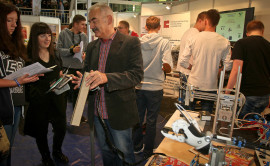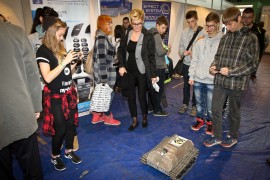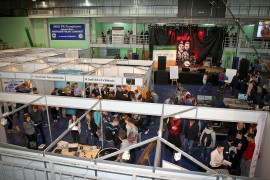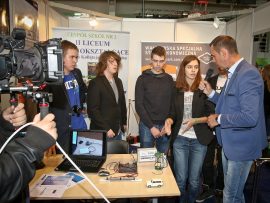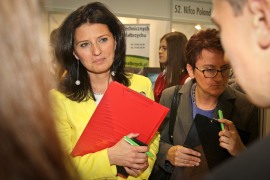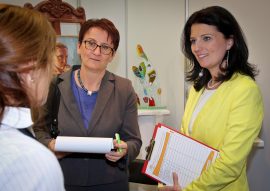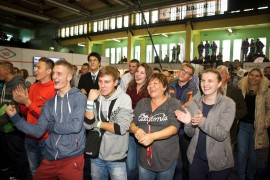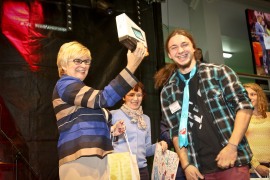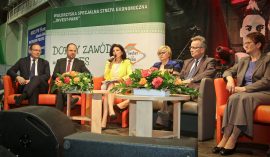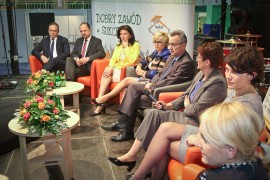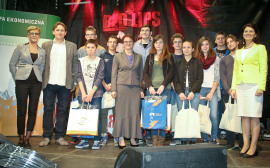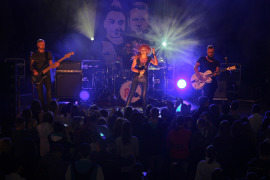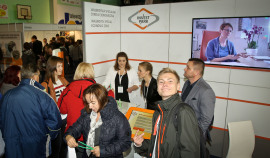Sixty-four exhibitors: companies, vocational schools and colleges, around a thousand participants. Presentations, competitions, a motivational lecture, an economic debate, and, at the very end, a concert of the Red Lips band – this, in a nutshell, is what happened during the 1st Lower Silesian Fair for Future Jobs, Innovation and Export, which was held in Jelenia Góra on 9 October. The fair was organized by the Wałbrzych Special Economic Zone “INVEST-PARK” under the patronage of the Ministry of Economy and the Mayor of Jelenia Góra.
Adapting the vocational education system to the needs of the modern economy by promoting cooperation between schools and companies is the main aim of the actions conducted by the Ministry of Economy in cooperation with other ministries, special economic zones, enterprises and schools.
“For the last several years we have been working towards the creation of a system of education that would provide young people with good, highly-demanded jobs, and consequently – stable and well-paid employment. On the other hand, this is the reaction to the expectations of employers, not just in special economic zones, who are looking for adequately qualified workers who would be familiar with the newest technologies and machines, and who would be willing to take up jobs immediately. Changing the vocational education system and restoring its prestige lies in the interest of all of us,” said Ilona Antoniszyn-Klik, Deputy Minister of Economy.
Her opinion is shared by teachers.
“Without vocational education, we won’t be able to produce anything, and this is the starting point – after all, we aren’t going to attract specialists from other countries. These are good schools, and my family is the best example. My grandfather, father and I attended Energetyk, and now I am a teacher here. Also my son graduated this school, and he is currently doing his PhD degree in Norway,” argues Dariusz Cisek, a vocational teacher at the Energetyk Complex of Polytechnic Schools in Wałbrzych.
“An engineer’s degree is one of the most sought-after qualifications in the labor market, and our graduates have no trouble finding jobs. We even have a saying, ‘the job found me after graduation.’ We often meet with people who finished our university and we are proud to say that they are doing well,” said Małgorzata Smutkiewicz of the Recruitment Department of Wrocław University of Technology.
Last year, the Ministry of Economy succeeded in amending the act on special economic zones. According to the amendment, supporting vocational education is now the duty of the zones. Also on the Ministry’s initiative, an agreement between the Ministry of National Education, the Ministry of Labor and Social Policy, and the Ministry of Treasury was concluded, which defines the scope of cooperation with respect to vocational education. In order to implement the resolutions, special economic zones have created Educational Clusters, which provide a platform for permanent cooperation between entrepreneurs, schools, the zones, self-governments, regional education authorities, labor offices, etc. The clusters’ main task is to activate cooperation between partners, forecast the demand for particular skills and jobs, and increase the availability of practical vocational training, including the dual system. The establishment of the clusters has been well received by both schools and the business world. The clusters created by the Lower Silesian zones today group several dozen partners and are constantly growing.
The 1st Lower Silesian Fair for Future Jobs, Innovation and Export was yet another initiative promoting vocational education. According to Barbara Kaśnikowska, President of the Wałbrzych Special Economic Zone “INVEST-PARK”, the fair is the best form of practical career counseling.
“The zones have become involved in the changes in the vocational education because they keep in touch with many firms in various industries. Using vehicles such as the “INVEST in EDU” cluster or today’s fair, we want to facilitate cooperation by enabling the representatives of schools and firms to meet. It is important to determine the needs of companies, not just those functioning in the zones, and to compare it with what schools offer. Potential gaps must be identified and filled in order to adapt the curricula to the labor market. These actions have already brought tangible results in the form of company-sponsored classes, apprenticeship programs, scholarships, etc.,” emphasized Barbara Kaśnikowska, President of the Wałbrzych Special Economic Zone “INVEST-PARK”.
Faurecia is an example of good practices in cooperation between business and schools.
“Year by year, there are increasing difficulties with finding properly qualified employees who would be familiar with the newest technologies. This is why we promote the dual education system, in which theory is taught in school and practical classes are held in companies. Faurecia cooperates with School Complex no. 5 in Wałbrzych, mainly with the mechatronics students, who could be employed in the Maintenance Department after graduation. The students can undergo work practice in our company, and we also offer apprenticeships. The best ones among them can count on permanent jobs with us,” said Małgorzata Konsewicz of Faurecia Wałbrzych S.A.
The fair was an excellent opportunity for schools to promote themselves and demonstrate that today’s curricula are nowhere near the stereotypically negative perception of the simplicity of vocational education. Drones, robots, cosmic probes and bolides made a big impression on the visitors.
“These are robots built from servomechanisms, which can have the shape of a vehicle or a human – the possibilities of expanding them are virtually limitless. It is all up to the imagination, knowledge and skills of the designer. This is how we learn about the programming, functioning and ways of using of servomechanisms, it is really fascinating,” said Robert Brączyk, a student of Wilhelm Rotkiewicz School Complex no. 1 in Dzierżoniów.
“We are a Polish-American company producing machines used in the paper industry, and we are one of the largest employers in the region. We are presenting our offer at this fair because we are looking for talented youths. We offer employment opportunities to specialists in various fields: sales representatives, designers, project managers as well as machine operators and logisticians,” said Maja Maisner, Development Director at PMPoland S.A.
“We want to promote ourselves, mark our presence in the job market, make our offer known to high schools and colleges. We are looking for people with technical education, especially electronics engineers, mechanics, automation specialists, quality engineers, project managers. All of them must be able to communicate in English. During this fair we have also been talking with other companies about their cooperation with special economic zones and the benefits arising from doing business in them,” said Olga Godziewicz, HR Manager at GE Energy Management Industrial Solutions.
“Daicel is a manufacturing company that is currently implementing a new business strategy based on the construction of an R&D center. We are so active in the labor market, visiting high schools and colleges, because we are looking for new personnel. We mainly offer technical jobs and middle management ones. We are here because we want the students to be aware of what jobs will be in high demand in the future,” said Dominika Ciara, Personnel and Administration Director at Daicel Safety Systems Europe sp. z o.o.
“The fair is very interesting. We are shown what future education options we have. Most of us are probably going to choose Wrocław University of Technology. The stands and what the firms offer are very encouraging,” thinks Michał Plata of Hugo Kołłątaj School Complex no. 2 in Wałbrzych.
“The fair is a useful initiative to find out what opportunities exist, what high schools and colleges offer, what employees companies are looking for, and what sort of education one should choose to easily find a good job. Choosing a vocational school is no shame; on the contrary, I think that those who go to schools of general education would not be good enough to study in technical schools. We have more classes, vocational lessons and apprenticeships alongside general subjects. But it is worth making the effort because it guarantees a better future,” said Wojciech Jacek of Nowa Ruda Technical School.
The importance of innovativeness and export in the growth of companies was also discussed at the fair. During the discussion panel, the conditions of doing business in Poland and abroad and the existing mechanisms for supporting exports were debated. Ilona Antoniszyn-Klik, Deputy Minister of Economy, emphasized that the development of high tech industries and innovativeness in small and medium-sized companies should become a business standard in the next few years.
“Our priority is modern, innovative projects created directly in companies in the region. We have outstanding, creative and highly educated engineers, scientists, and designers, which is extremely important for the development of our country. We cannot and do not want to rely exclusively on foreign ideas. We want our solutions to conquer the world, we want Polish technical thought to be a well-known and respected brand. To export project and not just goods. This is why in the next few years the Ministry of Economy is going to put huge emphasis on R&D, innovativeness, investing in knowledge, in high technologies and creating our own know-how. Companies at the highest technological level should be a priority for any modern country, and we have prepared many programs of support for them. I encourage you to use them,” said Ilona Antoniszyn-Klik, Deputy Minister of Economy.
During the fair, the “Most Innovative Project of the Lower Silesian Fair for Future Jobs, Innovation and Export” was chosen. One higher education institution was rewarded – Wrocław University of Technology, and three secondary schools – “Energetyk” Complex of Polytechnic Schools in Wałbrzych, School Complex no. 5 in Wałbrzych, and School Complex no. 1 in Dzierżoniów. The art competition titled “Future Jobs Vision” was won by Michał Szewczyk of Artistic Craftsmanship School Complex in Jelenia Góra. Wojciech Jacek turned out to be the most well-informed participant in the general knowledge quiz about the labor market, economic cooperation with foreign countries and innovative jobs. Faurecia Wałbrzych granted an award to the winners of a simulation game that reflected the processes in a car company.
The final highlight of the fair was a musical one – a concert by the Red Lips band.
